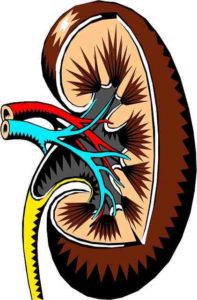KIDNEY HEALTH
Prevention is Key to Your Health.
Get Tested & Stay Healthy
2730 Union Ave, Suite B
San Jose, CA 95124
(408) 684-8600
Kidney Health
The kidneys have several important functions. They are:
Remove Waste. The kidneys filter waste products and excess fluid out of the blood and remove them from the body in the form of urine. Waste products and excess fluid are produced by the normal breakdown of food and the chemical reactions that occur in cells throughout the body (metabolism). Filtering waste products is the most important function of the kidneys. Keep the right balance of chemicals in the body. The kidneys keep the right balance of chemicals, such as sodium, potassium, calcium, magnesium, and other substances your body needs to function properly. They filter excess amounts of these chemicals from the blood and get rid of them in the urine.
Make Hormones. The kidneys produce three important hormones: renin, erythropoietin, and the active form of vitamin D. Renin helps regulate blood pressure. Erythropoietin is needed to make red blood cells. Your body needs the active form of vitamin D to absorb calcium from food. Together, vitamin D and calcium help build healthy bones and maintain normal muscle function.
Kidney Disease
The kidneys are a major organ and can be affected by a variety of diseases, some of which are listed below:
- Acute Kidney Injury (AKI): A sudden decrease in kidney function, often caused by factors such as dehydration, low blood pressure, or certain medications.
- Chronic Kidney Disease (CKD): A gradual loss of kidney function over time, often caused by conditions such as high blood pressure, diabetes, or glomerulonephritis.
- Nephrotic Syndrome: A group of symptoms caused by damage to the kidneys' filtering units, leading to excess protein in the urine and fluid buildup in the body.
- Nephritis: Inflammation of the kidneys, often caused by infections or autoimmune disorders.
- Kidney stones: Hard deposits that can form in the kidneys and cause pain when they move through the urinary tract.
- Polycystic Kidney Disease (PKD): A genetic disorder characterized by the growth of multiple cysts in the kidneys, leading to reduced kidney function over time.
- Glomerulonephritis: Inflammation of the tiny filters within the kidneys, leading to damage and scarring.
Early detection and treatment of kidney disease is crucial in preventing further damage and preserving kidney function. If you experience symptoms such as fatigue, swelling, decreased urine output, or changes in the appearance of your urine, it's important to see a doctor for a proper evaluation.
Kidney Health - Good Practices
Kidney health is an important aspect of overall health, as the kidneys play a crucial role in filtering waste and excess fluids from the blood. Maintaining good kidney health involves taking care of your health overall, such as maintaining a healthy diet, controlling blood pressure, and keeping diabetes under control. Here are some tips to help support kidney health:
- Stay hydrated: Drinking plenty of water can help flush out waste and toxins from the kidneys.
- Eat a healthy diet: A balanced diet that is low in salt, sugar, and unhealthy fats can help maintain healthy blood pressure levels and support kidney function.
- Control blood pressure: High blood pressure can put a strain on the kidneys, so it's important to keep it under control.
- Exercise regularly: Physical activity can help maintain a healthy weight and reduce the risk of high blood pressure and diabetes, both of which can damage the kidneys.
- Don't smoke: Smoking is a major risk factor for many health conditions, including kidney disease.
- Limit alcohol consumption: Excessive alcohol consumption can damage the kidneys and lead to dehydration.
- Get regular check-ups: Regular check-ups with your doctor can help monitor your kidney function and catch any problems early.
If you have a family history of kidney disease or other risk factors, it's especially important to pay attention to your kidney health and follow these tips. If you experience any symptoms such as pain or swelling in your legs, frequent urination, or changes in the appearance of your urine, it's important to see a doctor.
Testng for Kidney Health
After reviewing your concerns,vitals, medical history, review of systems; Dr. Malhotra will order Lab panels to assess the course of action including medications, food supplements, lifestyle and if needed referral to specialists for state of the art treatments.
When to Get Tested
Most people with mild symptoms are usually advised to change their lifestyles, including diet, exercise habits, take food supplements and stress levels, to see if such changes can improve symptoms.
Make an appointment to a consult with Dr. Nema Malhotra to confirm if testing is right for you and determine a holistic treatment plan.
Contact Us for Chronic Fatigue
(408) 684-8600















